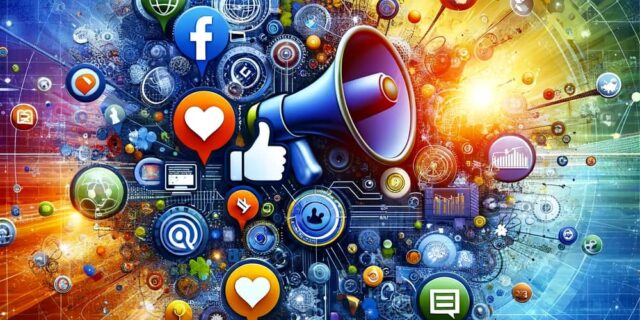In recent years, artificial intelligence (AI) has revolutionized various industries, and social media marketing is no exception. As businesses strive to enhance their online presence and engage with audiences more effectively, AI has become an essential tool in shaping marketing strategies. Here’s a closer look at how AI is transforming social media marketing and the benefits it brings to businesses.

1. Enhanced Targeting and Personalization
AI enables marketers to analyze vast amounts of data from social media platforms, helping them understand consumer behavior, preferences, and trends. By leveraging machine learning algorithms, businesses can create highly targeted advertising campaigns that resonate with specific audience segments.
For example, platforms like Facebook and Instagram use AI to determine which ads are shown to which users based on their online behavior, interests, and demographics. This level of personalization not only increases the effectiveness of campaigns but also enhances user experience, making consumers feel more connected to brands.
2. Content Creation and Curation
AI-driven tools are increasingly being used to assist in content creation and curation. From generating social media posts to suggesting topics based on trending keywords, AI can streamline the content creation process. Tools like ChatGPT can help marketers draft engaging copy, while platforms like BuzzSumo can identify popular content in specific niches.
Furthermore, AI algorithms can analyze user engagement metrics to determine what types of content perform best, allowing marketers to refine their strategies continuously. This data-driven approach helps brands maintain a consistent and relevant online presence.
3. Social Listening and Sentiment Analysis
AI plays a crucial role in social listening, enabling brands to monitor conversations and sentiments surrounding their products and services in real time. By analyzing user-generated content, comments, and reviews, AI tools can identify trends, sentiment shifts, and emerging topics of interest.
For instance, sentiment analysis tools can determine whether conversations about a brand are positive, negative, or neutral. This information helps businesses respond proactively to customer feedback, manage their online reputation, and tailor their marketing strategies to align with consumer sentiments.
4. Predictive Analytics for Future Trends
With the ability to process and analyze historical data, AI can provide valuable insights into future trends. Predictive analytics tools can forecast upcoming social media trends, enabling brands to stay ahead of the competition. By understanding consumer behavior and preferences, businesses can adjust their marketing strategies accordingly, ensuring they remain relevant in a rapidly changing landscape.
For example, AI can identify rising influencers in specific niches, allowing brands to collaborate with them before they become mainstream. This proactive approach can significantly enhance a brand’s visibility and credibility.
5. Chatbots and Customer Engagement
AI-powered chatbots have transformed customer engagement on social media. These virtual assistants can handle customer inquiries, provide instant responses, and guide users through their buying journey 24/7. By automating customer service, brands can enhance user experience while freeing up human resources for more complex tasks.
Chatbots can also analyze user interactions to identify common questions and issues, helping businesses improve their products and services. Additionally, they can facilitate personalized communication, ensuring customers feel valued and understood.
6. Optimizing Ad Spend
AI algorithms can optimize advertising budgets by analyzing performance metrics and adjusting bids in real time. This ensures that marketing budgets are allocated efficiently, maximizing return on investment (ROI). For example, AI can automatically increase ad spend on high-performing campaigns while reducing it on underperforming ones.
Moreover, machine learning models can predict which audience segments are likely to convert, allowing marketers to focus their efforts where they are most likely to yield results.
7. Measuring Success and Campaign Performance
AI simplifies the process of measuring the success of social media campaigns. Advanced analytics tools can track key performance indicators (KPIs), such as engagement rates, conversion rates, and return on ad spend. By providing actionable insights, these tools enable marketers to make informed decisions and refine their strategies for better results.
Additionally, AI can conduct A/B testing more efficiently, allowing marketers to experiment with different ad formats, messaging, and visuals to determine what resonates best with their audience.
Conclusion
The impact of AI on social media marketing is profound and far-reaching. By leveraging AI technologies, businesses can enhance targeting, optimize content creation, engage customers more effectively, and measure success with precision. As social media continues to evolve, those who embrace AI-driven strategies will undoubtedly gain a competitive edge in the digital landscape.


No responses yet